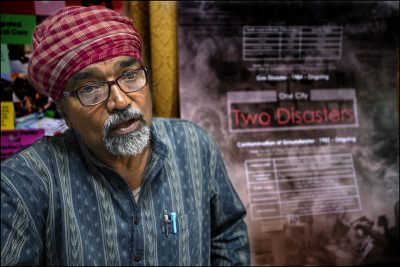
At a press conference on the eve of the 34th anniversary of the Bhopal Gas Disaster, staff from the Sambhavna Trust Clinic presented a report based on research carried out on the comparative state of health and health care in populations exposed to Union Carbide’s toxic gas against those not exposed.
Ayurvedic physician, Dr. Mrithyunjay Mali highlighted the fact that data from 2221 persons from a gas exposed group and 953 persons from an unexposed group demonstrates that the death rate is 28% higher in the gas exposed population as compared to the unexposed population. He added that, twice as many persons are dying of cancers, diseases of the lungs and tuberculosis and three times as many from kidney disease in the gas exposed population as compared to the unexposed.
Community Research worker, Tasneem Zaidi said that illness in the gas exposed population is 63% more than in the unexposed. Complaints of breathing problems, panic attacks and chest pain are also higher in the exposed population as compared to the unexposed.
Community Research worker Santosh Kshatriya said that incidence of persons receiving treatment for illness is 30% higher in the exposed population.
Community health worker Farhat Jahan stated the report’s conclusions and recommendations were as follows:
- The Government must set up a system of registration of deaths of persons with direct or indirect exposure to union Carbide is toxic gases
- In view of the significantly higher rates of deaths due to cancer in the present study, and the fact that well over 5000 gas exposed cancer patients have been paid ex-gratia by the government there is an urgent need for review of the work of the Population Based Cancer Registry in Bhopal that claims that there is no association between gas exposure and cancer.
- Significantly higher rates of illness among gas exposed despite the passage of over three decades should propel the government to review the system of health care and in particular pulmonary healthcare and make improvements without delay.
- Significantly higher rates of diseases of the kidneys among the gas expose could well be associated with prolonged use of painkillers along with toxic exposure. While the government is already paying ex gratia to gas exposed with kidney diseases, there is need to urgently review drug utilisation in the care of gas exposed persons to avoid kidney damage.
Report: Status of Health and Healthcare in Gas Exposed and Unexposed Populations


